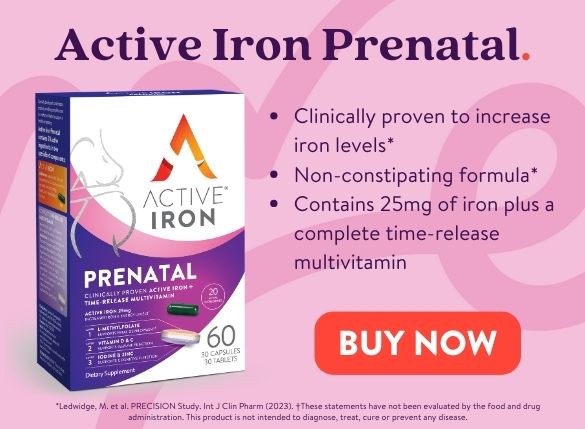Pregnancy is a transformative experience, often filled with excitement, anticipation, and a fair share of challenges. Among these challenges, constipation is a common but often overlooked issue that many pregnant women face. Understanding the causes, recognizing the symptoms, and exploring safe treatments can help alleviate discomfort and promote a healthier pregnancy journey.
How Common Is Constipation During Pregnancy?
Constipation affects between 11-38% of pregnant women¹, making it one of the most common gastrointestinal issues during pregnancy. It can start as early as the first trimester and may persist throughout the pregnancy, especially in the later stages when the growing baby exerts more pressure on the intestines.
What Causes Constipation During Pregnancy?
Constipation during pregnancy is primarily caused by hormonal changes. The hormone progesterone, which increases during pregnancy, relaxes the muscles of the digestive tract, leading to slower movement of food and waste through the intestines. This slowdown allows more water to be absorbed from the bowel, resulting in harder stools that are difficult to pass.
Additionally, as the pregnancy progresses, the growing uterus puts pressure on the intestines, further hindering bowel movements.
Other contributing factors include:
- Reduced Physical Activity: As the pregnancy progresses, some women may decrease their physical activity, leading to slower digestion.
- Dietary Changes: Cravings or aversions might lead to a diet low in fiber, exacerbating constipation.
Symptoms of Pregnancy-Related Constipation
The symptoms of constipation during pregnancy are similar to those experienced outside of pregnancy, but they can be more pronounced due to the changes in the body. Common symptoms include:
- Infrequent bowel movements (fewer than three times a week)
- Hard, dry stools that are difficult to pass
- Abdominal bloating and discomfort
- A feeling of incomplete evacuation after a bowel movement
When Can Pregnancy Constipation Start?
Constipation can start at any time during pregnancy but is most common in the first trimester due to the rapid increase in progesterone levels. Some women report feeling relief in the second trimester. But it can continue or worsen in the third trimester as the uterus expands and places more pressure on the intestines.

How Can I Avoid Constipation During Pregnancy?
Preventing constipation during pregnancy involves making some lifestyle and dietary adjustments. Here are some tips:
- Increase Fiber Intake: Eating a diet rich in fiber can help regulate bowel movements. Include plenty of fruits, vegetables, whole grains, and legumes in your diet.
- Stay Hydrated: Drinking plenty of water is essential for softening stools and promoting regular bowel movements. Aim for at least 8-10 glasses of water a day.
- Exercise Regularly: Gentle physical activity, such as walking or prenatal yoga, can stimulate digestion and help prevent constipation.
- Eat Small, Frequent Meals: Smaller meals can be easier to digest and can reduce the risk of constipation.
- Consider Natural Remedies: Some pregnant women find relief from constipation by consuming prune juice, peppermint tea or incorporating flaxseed into their diet.
Treatments for Pregnancy Constipation
If lifestyle and dietary changes do not provide relief, there are safe treatment options available:
- Fiber Supplements: Over-the-counter fiber supplements such as fybogel can help add bulk to the stool and make it easier to pass.
- Laxatives: While some laxatives are safe during pregnancy, they should be used with caution and under the guidance of a healthcare professional. Stimulant laxatives, in particular, should be avoided as they can cause uterine contractions.
What Are the Side Effects of Constipation Treatments?
While treatments for constipation are generally safe during pregnancy, they can have side effects, and you should discuss with your doctor before commencing treatment:
- Fiber Supplements: May cause bloating and gas if not taken with enough water.
- Laxatives: Overuse of laxatives can lead to dependency, dehydration, and electrolyte imbalances. It’s essential to consult with a healthcare professional before using laxatives.
Iron Supplements and Constipation
Many prenatal vitamins contain iron, which assist with meeting the increased iron need during pregnancy, but can contribute to constipation. Active Iron’s Kind & Strong formula allows for consistent supplementation over time while helping to avoid the unpleasant symptoms. Their unique protein formula improves iron absorption and decreases the likelihood of unpleasant symptoms by travelling through the stomach and to the natural site of iron absorption – the small intestine².
Therefore, the stomach is not exposed to excess unabsorbed iron, its non-constipating mechanism is clinically proven to deliver 2X better absorption and help avoid gut irritation¹. It is also proven to increase iron levels by 94% in 6 weeks³. Active Iron Prenatal contains non-constipating Active Iron plus a complete time-release multivitamin providing all the key nutrients for mum and baby.
Below are some summarised tips to consider when supplementing with oral iron and how to specifically alleviate the symptoms of constipation:
- Including fiber-rich foods in your diet such as whole grains, legumes, fruits and vegetables can make stools easier to pass.
- Vitamin C. A glass or orange juice alongside your oral supplement can promote absorption and in turn can decrease the amount of excess iron in your GI tract.
- Stay hydrated. Insufficient fluid intake is a leading cause of constipation.
- Incorporate a probiotic to promote a healthy gut.
- Exercise or physical movement can stimulate healthy bowel movements.
Conclusion
Constipation during pregnancy is a common issue, but there are things you can do to reduce discomfort. By understanding the causes and implementing preventative measures, you can reduce the likelihood of experiencing constipation. If it does occur, safe and effective treatments are available. Always consult with your healthcare professional before starting any new treatment to ensure the safety of you and your baby.
With the right approach, you can manage constipation and enjoy a more comfortable and healthy pregnancy.
¹Vazquez, Juan. (2008). Constipation, haemorrhoids, and heartburn in pregnancy. BMJ Clinical Evidence. 2008.
²Wang et al. 2017, Acta Haematologica, 138: 223-232.
³Ledwidge, M. et al. PRECISION Study. Int J Clin Pharm (2023) https://doi.org/10.1007/s11096-023-01640-7

Marie Louise, The Modern Midwife
BSc (Hons) RM & PTTLS
Marie Louise, a seasoned midwife with over 12 years of experience and a mother of two, is the accomplished author of ‘Pregnancy, Birth & Beyond’ and ‘The Modern Midwife’s Guide To The First Year’. Additionally, she excels as a hypnobirthing and Childbirth Educator.
Read more about our expert here.


